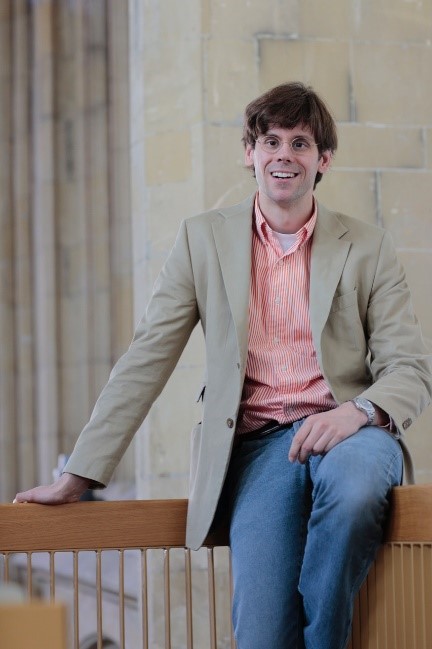ESST Student Blog: Reflection and Post-Graduate Plans

After a gruelling year of ESST, marked by an especially challenging thesis-writing period, I am a graduate! In this post, I reflect on what ESST has done for me and answer the burning question that I get all the time: "So, what's next?"
No Such Thing as Calm Before or After the Storm
When you have reached the end of a such a challenging program as ESST, you can barely remember the details of what happened: the long nights, the long pieces of jargon-rich texts, and the longing for all this to end so you can run off to your summer vacation plans. One year flies by when major decisions such as your specialisation, your thesis topic, and your post-graduation plans follow each other so closely. Having been used to such a high level of intensity, along side managing my work and private life, have really shown me how much I needed that vacation, haha.
Once my thesis grade was known (I consider it the unofficial announcement that you're a graduate), I was able delete all those saved websites and return the library books (renewed an eye-raising number of times) and say "I did it, I have done it, and now...what am I going to do?" I was not too enthusiastic about addressing the last question (in response, I ran away to a summer school and signed a contract for one year of work at UM) because it meant confronting a fear a lot of graduates have: will I be able to find a career in my field/interest? Will I be able to actually use the knowledge and skills that I have acquired and translate them to qualities that the job market is looking for? And more importantly: did I do enough during my Master in terms of preparing myself for life after the books? Perhaps the last question is more personal as one frustrating question I cannot help but ask myself is: what more can I do to show people I am a competent researcher and a desirable future employee? This question can only be answered partially by me because as competent as I perceive myself to be (which is highly subjective in the first place), the other part of the answer is in the hands of my future employers. Perhaps a hard truth for fresh graduates is that our competency does not speak for itself as yet and we are at the mercy of our assessor(s) a.k.a. employer(s). Furthermore, the general consensus from my established work colleagues (PhD students, post-doctoral researchers, and professors) when discussing job prespects is that the current labor market in academia expects much more than just a degree with good grades. Have you done extra-curricular activities that can also translate to skills desirable for a working environment? What about work experience that is not just small administrative tasks? How about your competency with technical skills such as social media channels and software? Have you published anything or plan to with your final course work?
The Never-Ending Meta-Analysing (Thanks STS)
These are some thoughts that I have followed me since Day 1 and it is through these thoughts that I saw the relevance of ESST to my future career. Mixed in with my own interests in development, social justice, and political philosophy, ESST, or more generally Science and Technology Studies (STS), has indeed made it both harder and easier to point out my competencies as a future researcher. From the less positive side, it is not easy to explain how being able to see problems broadly and as being embedded in social structures is a skill that needs to be carefully crafted and honed, and is not an innate ability that one acquires if you read enough books, especially with chapters that are explicitly labelled "Limitations" or has the phrase "we see both sides to an issue" in them. However, STS does not have a monopoly on being able to reflect on its own theoretical or conceptual short-comings so what makes me, to a person with no knowledge of my field, different from a law or medicine graduate who has also taken a course vaguely labelled along the lines of "An Introduction to Medical Ethics" or "Corruption 101"? (This is of course a caricuture but we should not fail to acknowledge the (socially constructed) authority that some fields/disciplines have been strongly associated with over others).
But from a more positive perspective, I know, based on the reaction of my listeners and readers, my articulation and understanding of some issues do more than repeat the (often already critical) status quo and are far more nuanced than someone who has studied (issues from) a single discipline such as law, economics, or the 'hard' sciences. ESST and STS programs in general have emphasised the interdisciplinarity in the research perspective and methods. Interdisciplinarity is not simply the collaboration with more than one discipline in addressing a challenge in order to have a more holistic view--it also acknowledges that each discipline has its own set of principles, theoretical frameworks, and research methods that structure one's way of seeing problems and how these features in turn affects how problems are addressed. Some perspectives might fail to consider other social or material factors. STS has the inherent ability of being able to adopt economics, history law, gender studies, philosophy, and other fields and translate it to a coherent way of conducting research or addressing problems. Of course, the field is not without its flaws. The academic world of STS is still very much a dominated by certain cultural and gendered ways in their thinking and research traditions. Works by women, non-binary folx, and non-white scholars are still unfortunately lacking in STS and for those whom are scholars, their work is not as prominently featured or given the same respect and regard as that of established scholars. The STS community can do better by identifying and addressing structural issues and think of ways on how to foster more diversity and inclusivity.
"So, What's Next?"
Before I get to that burning question, I need to take a moment to express my gratitude to Maastricht University and a number of people for their contribution to both my personal and academic growth. I echo Newton's sentiment when he stated: "If I have seen further than others, it is by standing upon the shoulders of giants". My own capacity played a role in my development but it would not be without the influence of so many. I have been fortunate enough to have four (BA and MA) administratively smooth-sailing years, all thanks to the competency of the administrative staff, my tutors, colleagues, and lecturers. I would not be the person (whom I am proud of being) today had it not been for the Arts and Culture and ESST programs and the tutors and friends I had met along the way. I do not take for granted that meeting and being under the guidance of each of my tutors has contributed (to varying degrees) to developing my capacity as a student, a researcher, but more importantly a better person in terms of compassion and empathy towards issues I do not understand or experience. I am especially grateful to have met Dr. René Gabriëls, whose impassioned calls for social justice served to shake me from my own liberal complacency and what might have been a path to intellectualising pressing issues from an ivory tower. His teachings have fundamentally changed the way I think (for the better) and for that, I cannot express in mere words my gratitude so I will become someone who will shake up the status quo of wherever I go. Along side my BA studies, I was fortunate enough to work for Prof. Dr. Thomas Christiansen and have been given so opportunities that a young student/budding researcher could only hopelessly hope for. Like before, I cannot express my thanks in just words so I will give it my all as we continue working together for perhaps which might be our final year. And finally, from the STS side of things, special thanks must be given to Dr. Vincent Lagendijk for his competent coordination of the ESST program and more personally, his kind guidance and readiness to offer a listening ear, and to Dr. Jens Lachmund, my MA supervisor, with whose patience and expertise I could not have done without in order to successfully completed my thesis. I could only get this far because of these individuals and I hope to do them proud.
Now, how am I currently doing them proud? As I mentioned, I will be taking a year off from studying and will continue my work for the journal and research centre. In the meanwhile, I will also be searching for jobs, mainly in research institutions such as think-tanks or consultancies, and PhD opportunities, starting at the end of August 2018 (when my contract ends). I would love to continue working for UM but I am keeping my options open as my experience has shown that not everything can be planned for. Sometimes, some things are unexpectedly thrown your way at the last minute.
As for this blog, it will not be my last post. I will be reflecting on each module to give future students a general idea of ESST. I will also continue documenting my post-graduate plans because we often hear about the job graduates get but not the sometimes slow and painful process they had to go through to get there. In the meanwhile, if you have any questions about the program, as usual, you can each me through my email at: s.tsui@student.maastrichtuniversity.nl.
Other blogs:
Also read
-
My dissertation was about the applicability of international children’s (human) rights to children living in Somaliland, an unrecognised state. Moreover, I studied how national laws protect children’s rights in Somaliland.
-
Codification of different areas of law took the stage in the nineteenth-century.[1] The process of scientific revolution – which had started with the Enlightenment and Humanist Movement and was followed by Rationalistic Natural Law Theorizing – led the way to codification.[2] Several jurisdictions...
-
Dear members of the UM Community,
As we start heading for the end of the academic year, it’s time for another update on what has been going on at the University Council.


